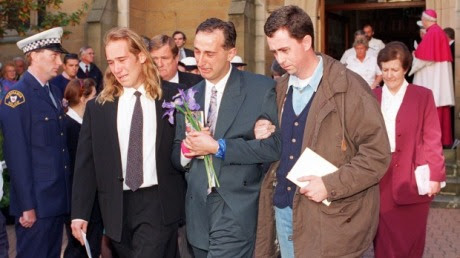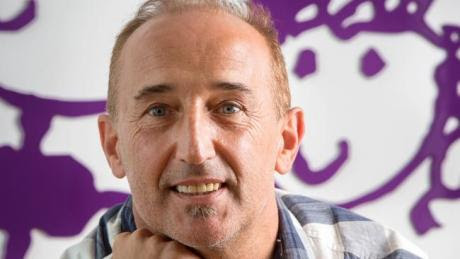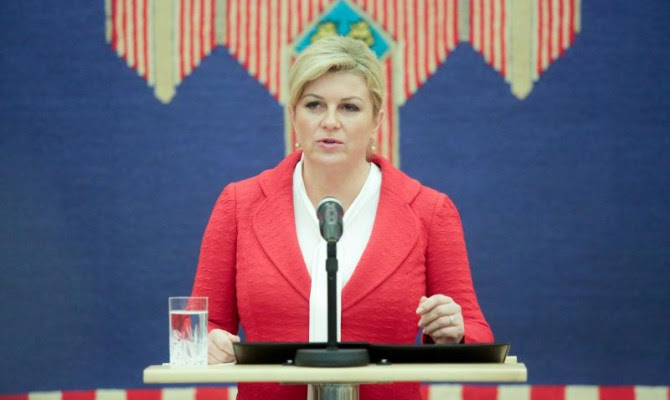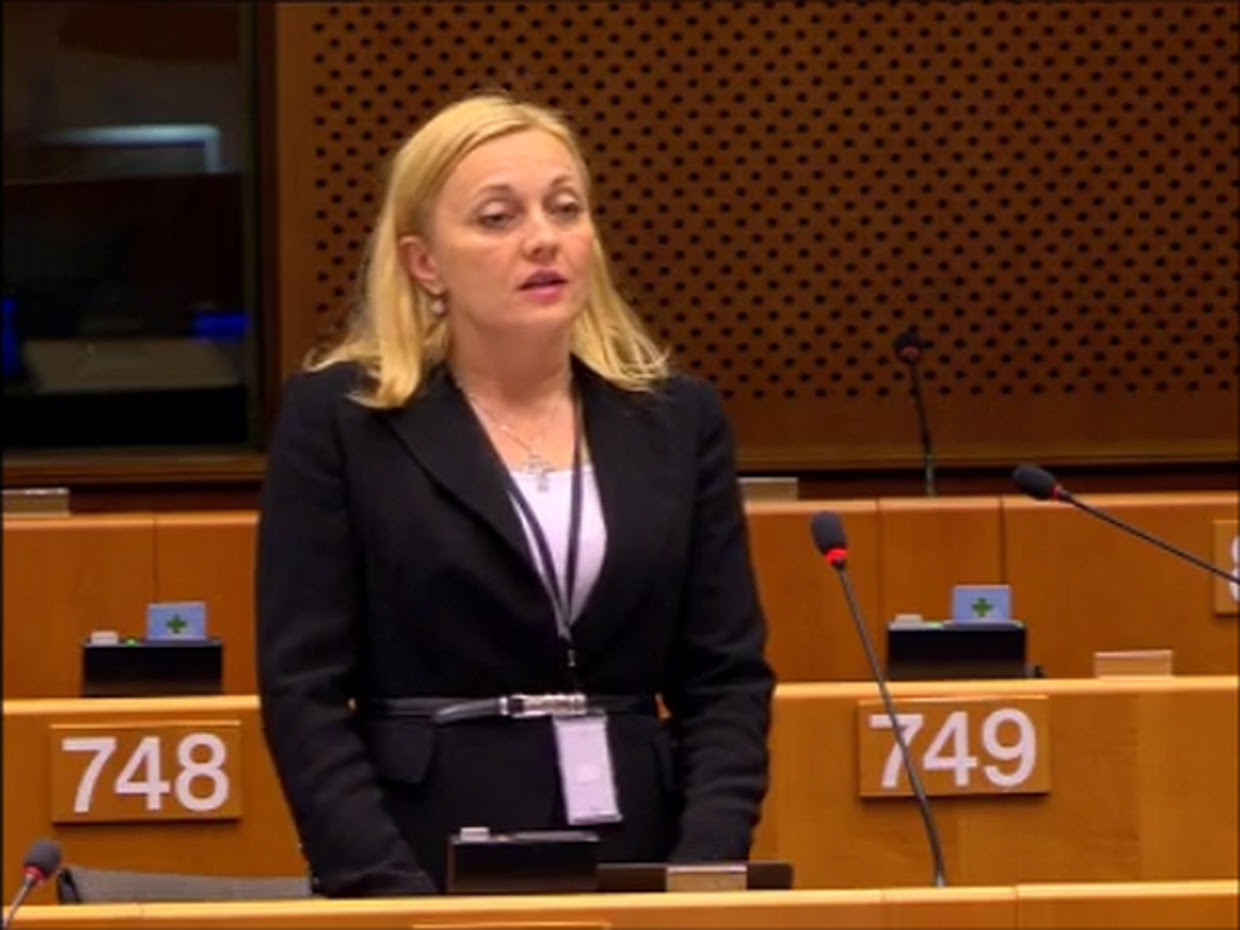URL: http://wp.me/p1Vqu6-2g9

Walter Mikac and
lost daughters: Alannah and Madeline
Photo: Screenshot
Alannah and Madeline Foundation
https://www.amf.org.au/gun-
lost daughters: Alannah and Madeline
Photo: Screenshot
Alannah and Madeline Foundation
https://www.amf.org.au/gun-
April 2016 marks the month of the 20th anniversary of Australia’s worst massacre by a single gunman (at Port Arthur, Tasmania) – and the 20th anniversary when the son of Croatian immigrants in Australia, Walter Mikac, became widely known, a household name and the national symbol of thePort Arthur Massacre. Walter Mikac lost his wife and two daughters on that 28th day of April 1996 at Port Arthur when a deranged gunman (whose name I will not mention here out of respect for the victims and their loved ones) went on a killing spree armed with semi-automatic assault rifles and killed 35 people and wounded 18. Out of that tragedy, out of Walter Mikac’s profound grief arose giant and brilliant legacies of tight gun ownership control laws, of love and remembering through a charitable foundation he set up that has so far helped more than1.5 million children who are victims to violence worldwide.Walter Mikac , born in 1962 Melbourne, the son of Croatian immigrants, married nursing sister, Nanette 'Netty' Patricia Mikac (nee Moulton, born 1960 Shepparton, Victoria) in 1985 in Melbourne. After Alannah 'Lani' and Madeline 'Maddie' were born, the family moved in 1994 to the town of Koonya, near Nubeena in Tasmania, where Walter became the local pharmacist and Nanette occasionally helped behind the counter. On Sunday morning 28 April1996, Nanette and her two daughters went to picnic at thepicturesque Port Arthur Historical Site, only ten minutes by car from their home, while Walter went to play golf nearby. In the early afternoon, Walter and his golf friend heard gunshots from the Port Arthur site but continued playing their game, thinking that the gunfire was due to a re-enactment of some historical event.

Family photo of Port Arthur massacre victims,
Nanette, Alannah (left) and Madeline Mikac,
with Walter Mikac.
Source:News Limited
Nanette, Alannah (left) and Madeline Mikac,
with Walter Mikac.
Source:News Limited
“Not long after, our family friend and local GP, Dr Pam Ireland, came and told me what had happened. She took me to the site, insisted the police let us through, and took me to see my family. For acceptance, that was very important. It meant there was no need for someone to describe or hide thedetails. I was able to hold each of them. The police didn’t cope with that very well, but Pam’s insistence made that happen, “ Walter said during a recent interview. “I truly believe the power of love and creation will always triumph over thepower of destruction and revenge,” he said.Mikac struggled hard and no matter how hard he tried he could not understand what allowed someone to kill that many people at the same time without being stopped! This terrifying puzzle led him to write a letter to thethen-Prime Minister of Australia, John Howard focusing on the need to prevent such carnage in the future, highlighting the need for tough gun controls. If people didn’t have such powerful guns in their possession or easy access then such massacres would not have a chance of occurring. Prime Minister Howard phoned Mikac the next day after receiving the letter and subsequently read it to a police ministers’ meeting to get some resolution about changing Australia’s gun laws.

Walter Mikac (centre)
with family and friends
at Memorial service
after Port Arthur massacre
Photo: Rick Stevens
with family and friends
at Memorial service
after Port Arthur massacre
Photo: Rick Stevens
The resulting gun reforms were a big thing. The laws were changed across Australia and many different types of guns were banned from civilian ownership and over 640,000 weapons were bought back by the Australian Federal Government and destroyed. It became harder to apply for a licence to own a firearm and difficult to own more than one. Prior to this legislative change, prior to prior to Port Arthur massacre, there had been 11 mass killings/shootings in Australia in 10 years – since then not a single one. Around this 20th anniversary of Port Arthur massacre there have been some moves to relax Australia’s gun ownership laws somewhat. At times of terror attacks and “ingrown IS terrorist cells” and increased violence in thestreets why would anyone want to change the laws that have been keeping Australians safe for the past twenty years. But, regretfully, like it or not, lunatics and those who want to make money in gun sales – do exist. Hence, Mikac is currently very active and has started a petition for Australia to keep its tight gun laws. The legacy of tight gun laws that arose form Mikac soon after the Port Arthur mass killings two decades ago – lives today. Petition link click HERE.
Alannah and Madeline (Mikac) Foundation was set up in 1997, a year afterthe Port Arthur massacre, and with Crown Princess Mary of Denmark (an Australian, a Tasmanian) as its ambassador the charity has spread to help children victims of violence and bullying beyond the shores of Australia. This too is a legacy, which arose out of the Port Arthur massacre, and the terrible grief it caused.
In 2001 Mikac married again and has a new family but the one so tragically lost at Port Arthur twenty years ago still lives and shines in his legacies and daily existence: in tough gun laws and in the Alannah and Madeline Foundation that helps so many children who suffer violence and works at preventing bullying as well as initiating programs that prevent violence. Furthermore, Mikac has written a book “A Circle of Life: replacing hardship with love” and is a motivational speaker of note. “A Circle of Life” is a collection of reflections on love and loss that focuses on the power of love to overcome obstacles, to heal suffering and to provide hope for the future. He also published “To Have and to Hold”, telling of the loss of his family inthe Port Arthur massacre in 1996.
Upon setting up the petition for tough gun laws Mikac recently said there was no reason for Australians to own semi-automatic or automatic guns as legalising these weapons would only raise the risk of danger and death for more Australians. He said it was his own personal goal, as well as theAlannah and Madeline Foundation's, to ensure no one else experienced thetrauma that he went through 20 years ago."A significant legacy and one of the only good things to come of the 1996 Port Arthur tragedy, the day I lost my wife and children, was theestablishment of the National Firearms Agreement 1996," Mikac said.Could not agree more and trust this legacy will hold its ground, for the safety of all, for many many decades to come. Respectfully I bow in respectful memory of all those who perished at Port Arthur in April 1996. Ina Vukic, Prof. (Zgb); B.A., M.A.Ps. (Syd)
Upon setting up the petition for tough gun laws Mikac recently said there was no reason for Australians to own semi-automatic or automatic guns as legalising these weapons would only raise the risk of danger and death for more Australians. He said it was his own personal goal, as well as theAlannah and Madeline Foundation's, to ensure no one else experienced thetrauma that he went through 20 years ago."A significant legacy and one of the only good things to come of the 1996 Port Arthur tragedy, the day I lost my wife and children, was theestablishment of the National Firearms Agreement 1996," Mikac said.Could not agree more and trust this legacy will hold its ground, for the safety of all, for many many decades to come. Respectfully I bow in respectful memory of all those who perished at Port Arthur in April 1996. Ina Vukic, Prof. (Zgb); B.A., M.A.Ps. (Syd)
Croatia: Jews Commemorating Holocaust Fuel Political Havocby inavukic |

Ognjen Kraus, front left,
head of Croatian Jewish Councils Coordination
at Jasenovac 15 April 2016
Separate commemoration of victims of Holocaust
Photo: Nikola Cutuk/Pixsell
head of Croatian Jewish Councils Coordination
at Jasenovac 15 April 2016
Separate commemoration of victims of Holocaust
Photo: Nikola Cutuk/Pixsell
Some 300 Croatian Jews from Croatian Jewish Councils have held their own Holocaust commemoration at the WWII Jasenovac camp site Friday 15 April, a week ahead of the official commemorative ceremony, in protest at what they say is government inaction in the face of what they maliciously insist is surging neo-Ustashi (pro-Nazi) sentiment in the country. They refer to, among other individual incidents, some “pro-Ustashi” chants at soccer games no government without taking away freedom of speech and bringingthe army can control (!). The ceremony at Jasenovac was attended also by representatives from a handful foreign embassies in Croatia, by Croatianmembers of parliament representing the Italian (Furio Radin) and Serbian minorities (Milorad Pupovac) in Croatia, the ex-president communist die-hard Ivo Josipovec, some handful of other so-called antifascists in Croatiawhose sole role in society seems to be negating and covering up communist crimes, which by the way were larger in numbers of victims than theHolocaust.“We have commemorated the victims of Jasenovac but also all the Jews who had perished in NDH (WWII Independent State of Croatia) under thethen race laws. We came here because there is a presence in Croatia of a revitalisation of the WWII Ustashi movement and a complete negation, regardless of some statements made after we announced our intentions not to participate in the official ceremony at Jasenovac,” Jewish association leader in Croatia, Ognjen Kraus, said, accusing the First Deputy Prime Minister, leader of the Croatian Democratic Union/HDZ, Tomislav Karamarko, of never having set foot on the Jasenovac Holocaust memorial site.
The “statements made” Kraus refers to here include the statement made byKolinda Grabar Kitarovic, president of Croatia, concerned about thedivisions with regards to commemorating the Holocaust victims in Jasenovac, said 11 April 2016 that “NDH (WWII Independent State ofCroatia led by the Ustashe forces) was the least independent and it protected the interests of the Croatian people the least, and that the Ustashi regime was a criminal regime. Anti-fascism is in the foundations of theCroatian Constitution, and modern Croatia has grown from the foundations of the Homeland War.” Croatian Constitution may be based on anti-fascism but certainly not on communism and given that Croatia’s communists who arise from Yugoslav communists call themselves antifascist even if they were nothing like anti-fascists but thugs and criminals, President Grabar-Kitarovic made a serious error here in missing this opportunity to make that distinction and calling thecommunist/Partisan WWII opposition to Ustashas also a criminal regime, then. For that is what they had proven to be and today’s leaders of Croatiamust acknowledge that, no matter what the pain and what the political cost to them personally.The truth is that while there were killings committed by both sides in WWII,the Ustashas goal was an independent Croatia and the Partisans’ one was communist Yugoslavia – no independence for any of the states forced previously into the Serb-led oppressive Kingdom of Yugoslavia and thepresident and all would do well to remember that especially when relating tothe 1990’s Homeland War behind which is the thousand-year of Croat plight for independence. A pot cannot call the kettle black and get away with it. People at large are neither blind nor stupid. If President Grabar-Kitarovic was intending to settlethe political spirits causing upsetting divisions around the Holocaust victims commemorations then her statements needed to cover fairness to all victims of WWII and post-WWII not just one side. She did disappoint quite a lot of people this time and demonstrated that her advisors may have absolutely no skills in political conflict resolution, which Croatia needs to rid itself of remnants of the criminal communist regime. That is what today’s Croatia, today’s world – require and demand. Throwing sand into the eyes was a thing that may have worked in the past – not today, not in a world of democracy where everyone’s rights are equal and knowledge-base and courage of “ordinary” citizens are much larger than decades before.

Zlatko Hasanbegovic
Minister for Culture, Croatia
Photo: zagorje.com/ Kruno Pavlina
Minister for Culture, Croatia
Photo: zagorje.com/ Kruno Pavlina
Whilst attending a cultural event in Krapina, Zagorje region outside capital Zagreb, Croatia’s minister for culture, Zlatko Hasanbegovic, responded to Kraus’ statements that Tomislav Karamarko had never been in Jasenovac and to his organisation of a separate commemoration in Jasenovac:"I regret that we are placed in situations where such statements can be heard, especially at the time leading up commemorations when we pay respects to the innocent. Whoever heard what Tomislav Karamarko was saying, can conclude that those (statements like Kraus') are not truthful statements… the organisers have had their reasons for organising one more commemoration and I respect them. We live in a free country,” said Hasanbegovic.The blind, let alone those with full vision, can see that such public displays of lies as has come out of the Jewish organisation’s leader Kraus, particularly representing a place of note – like the Croatian Jewish council coordination in this instance – seem to be more about desperate measures to protect communist crimes from full exposure and avoid a possible scenario where in relation to WWII and post-WWII Croatia the Holocaust crime would, in relation to number of innocent victims, take a second place in the realm of the worst and most atrocious crimes in human history to thecrimes committed by the Yugoslav communists. Wanting to acknowledge and unearth further the true extent of communist crimes in Croatia is labelled, sadly, it seems, even by some Jewish representatives as a return to Ustashi regime, to Nazism – in the hope perhaps to intimidate those trying to unearth the whole truth of communist crimes! One can imagine nothing crueler towards victims of crimes than this.As far as I am concerned and from this vantage point, Ognjen Kraus and those who attended the commemoration designed to shun the official one to be held on 22 April under falsehoods and malicious accusations against thecurrent centre-right government can hang their head in shame. Using remembrance of the Holocaust victims for dirty communist crime cover-up politics is just not the world of piety I want to be a part of.Attempts to uncover the full truth of communist crimes in Croatia have been labeled as resurgence of Nazism, Ustashism, of historical revisionism in thenegative sense that allegedly negates the truth of the Holocaust. And so it seems WWII Croatia when it comes to “bad guys” only had the Ustashas and not the Communist Partisans under Josip Broz Tito. What utter codswallop. Nobody has the right to stop or intimidate those wanting to unearth the truth about crimes and victims – not even those commemorating the Holocaust. In fact, I believe, that those commemorating the Holocaust should all encourage the seeking of the truth for all innocent victims.
The eminent American historian James M. McPherson, Princeton University, said in 2003, “that historians know that revision is the lifeblood of historical scholarship. History is a continuing dialogue, between the present and thepast. Interpretations of the past are subject to change in response to new evidence, new questions asked of the evidence, new perspectives gained by the passage of time. There is no single, eternal, and immutable ‘truth’ about past events and their meaning. The unending quest of historians for understanding the past — that is, revisionism — is what makes history vital and meaningful...Without revisionist historians, who have done research in new sources and asked new and nuanced questions, we would remain mired in one or another of these stereotypes.”I hope Croatia's leaders in government and others will know how to draw strength and courage from the words of this brilliant historian when it comes to pursuing the truth of communist crimes. In Croatia as part of communist Yugoslavia, investigating WWII and post-WWII crimes committed by communist regimes, as well as a revision of the 'official history' about theevents that took place during the Second World War, was not possible before 1990, after the democratic changes in Eastern Europe and Croatia. Resolution 1481/2006 of the Council of Europe Parliamentary Assembly strongly condemned human rights violations committed by totalitarian communist regimes and the 2008 Prague Declaration on European Conscience and Communism stated that these crimes were comparable with Nazi crimes but very few people have been tried for committing such crimes. Moreover, 28 years later, in former Yugoslav republics (e.g. Croatia) “this topic is still a matter of political and scientific debates, and those who dare to ask 'new and nuanced questions' are often labeled as the revisionists who should be treated by medical specialists,” said Blanka Matkovic, PhD dissertation Warwick University, UK. And “thanks” to the likes of the Jewish Councils coordination head in Croatia, Ognjen Kraus, those who question WWII crimes or their extent against the form we have been led to believe, those who cannot control or prevent extremist outbursts of individuals in thestreets or sports arenas… - are Nazis! Nothing less than Nazis! What an outrage! Ina Vukic, Prof. (Zgb); B.A., M.A.Ps. (Syd)
If anyone wants to go and see how minorities are mistreated, abused and persecuted in the 21st Century's so-called freedom and democracy go to Serbia and check out the abominable treatment of the Croatian minority inthe Vojvodina part of Serbia.This May marks 25 years from the time of widespread and brutal persecution of Vojvodina Croats from their homes under the attack of thecriminal Great Serbian policy from Slobodan Milosevic and the current Serbian government, in its desire to become an EU member state is doing nothing much to correct its wrongs of the past. In the 1990's Serbs did not only attack Croatia and Bosnia and Herzegovina to ethnically cleanse large areas of these sovereign countries but they also went about ethnically cleansing parts of Serbia (Vojvodina); targeting Croatian minority there. (Of course elements of such a criminal pattern would be also seen in theKosovo, then a province of Serbia, and its Muslim population.)When compared to 1990, there is only half of Croats still living in Vojvodina, Serbia. They are being discriminated against and their rights as a national minority – repressed. They have had no parliamentary representation in Serbia’s Parliament like Serbs living in Croatia have during the past two decades. The broadcasting of the radio and TV in Croatian language has been shut down; Serbia’s government also does not finance books and education in the Croatian language. Croats are often the targets of thievery, murder and physical attacks for which the assailants are rarely found. Catholic priests are also attacked and Catholic churches defiled. ReportsCro Portal. Croatian member of the European Parliament Marijana Petir alerted theEuropean Commission about this on several occasions in recent times. She asked the EC to protect the Croatian minority in Vojvodina.“The national authorities in Serbia are preventing Croats in Vojvodina from exercising their rights to language, culture and education in their mother tongue. All of the actions taken by the Serbian authorities in Vojvodina are aimed at favouring the Bunjevci — a group of Croats who do not wish to declare themselves Croats, but only Bunjevci — in order to assimilate them.Croats are prevented from exercising the rights that are guaranteed to them by the law and by international agreements. The Croatian National Council in Serbia and the Croatian Government are therefore obliged to spend their own resources on printing textbooks. Meanwhile, the Serbian Government refuses to reimburse them for thecosts of doing this and does not allow them to use public spaces for their cultural events. It is also attempting to squeeze out the Croatian language and replace it with the Bunjevac language. Given that Croats are citizens of the European Union, how will theCommission ensure that the rights of Croats in Vojvodina to language, culture and education in their mother tongue are exercised?” Petir askedthe EU Parliament in late 2015.
Johannes Hahn, EC Commissioner Neighbourhood and Enlargement Negotiations, replied that respect of fundamental rights and the protection of minorities are the key conditions for Serbia within the negotiation process and are dealt with in Chapter 23. He further explained that Serbia was completing its action plan regarding the protection of minorities and the EC expects from Serbia to take up the recommendations entailed in the EC Advisory board’s directions. Those recommendations, he said, are directed at education, use of language, access to media and religious practices inthe languages spoken by minorities. He concluded that Serbia, in practice, is bound to respect fundamental rights, including the right on property protection … As to the latter part of Hahn’s reply, the return of property tothe Croatian clubs and organisations (in Vojvodina) Mr Krunoslav Djakovic (President of Centre for Culture ‘Srijem” and Croatian House organisatuon) emphasised that “Croats are not asking for anything that would contradictthe law, but are asking from Serbia’s government to give them, as an ethnic minority, that which they have legal right to. If they don’t want to do that, that is breach of human rights”.Recently Petir said that she will not stop in her endeavours and that Serbia must ensure all the rights defined by the international agreements because if that does not happen, they will not be able to continue their European path. Petir also wants Croatia to start taking more care about Croats outside their country, and also the Croats in Vojvodina, so that their interests are protected and that they can have their right for a Croatian citizenship.
Last week, albeit reluctantly, following complaints by the Croatiangovernment, the European Council had once again postponed the opening of negotiations with Serbia in its desired accession to EU membership. Thepostponement has to do with two crucial chapters of the EU legislation, Chapter 23 (judiciary and fundamental rights) and Chapter 24 (justice freedom and security). Croatia did not and does not accept or endorse theEuropean Commission opinion that Serbia is ready to proceed to EU membership negotiations stage; all 28 countries, members of the EU must agree in order for any new membership negotiations to proceed.Croatia’s concerns are threefold: the lack of Serbian cooperation with theInternational Criminal Tribunal for the former Yugoslavia (ICTY); themistreatment of the Croatian minority in Serbia (Vojvodina); and theuniversal jurisdiction of Serbian courts over war crimes committed in other parts of the former Yugoslavia.It would seem that the EC sent a blind or a pro-Serbia bent person to Serbia during 2015 on task of investigating matters on progress made by Serbia with view to its path in becoming an EU member state. In its Progress Report (2015) EC writes:“ 2.4. Human rights and the protection of minorities - Overall situation - Thelegislation and institutions needed to uphold international human rights law are in place. Legislation to protect minorities and cultural rights is also broadly in place. However, sustained efforts are needed to ensure effective and consistent implementation across the country. Shortcomings particularly affect the following areas: • Conditions for the full exercise of freedom of expression are still not in place. Full implementation of the new media laws needs to be ensured. • Promotion and protection of the rights of the most vulnerable and discriminated groups, including the LGBTI persons, persons with disabilities, and persons with HIV/AIDS has yet to be fully ensured. Hate-motivated offences need to be properly investigated, prosecuted and sanctioned. • Efforts to improve the difficult living conditions of Roma and to combat discrimination need to be strengthened. Government coordination and leadership of Roma integration policy needs to be further improved…”Zilch on the widespread mistreatment of Croat minority in Vojvodina! One must, therefore, be very skeptical of the truthful representation of thesituation in Serbia regarding ethnic minorities within the EC. Croatia has theabsolute right to require same standards from Serbia as the EC required ofCroatia during the prolonged and painful period of negotiations as prospective member of the EU. Furthermore, let's hope that Croatia will persist in its requirements for Serbia to meet EU standards and turn away from nasty media and nasty politicians who try and belittle Croatia's attempts at demanding acceptable standards from Serbia. As long as abuse or mistreatment of rights of ethnic minorities exist in Serbia, Croatia must remain a watchdog for the EC.To reiterate Croatian foreign minister Miro Kovac words on 15 April 2016 HRT news "Croatia is neither a superpower nor a poodle. Croatia is a member state of the European Union. If we are admitting someone in our family we have to monitor the accession process and co-decide about it. If Serbia wants to be a part of the EU, it will have to adapt to its standards…” Ina Vukic, Prof. (Zgb); B.A., M.A.Ps. (Syd)
| Like Tweet Pin | Web Version Forward |
|

















Nema komentara:
Objavi komentar